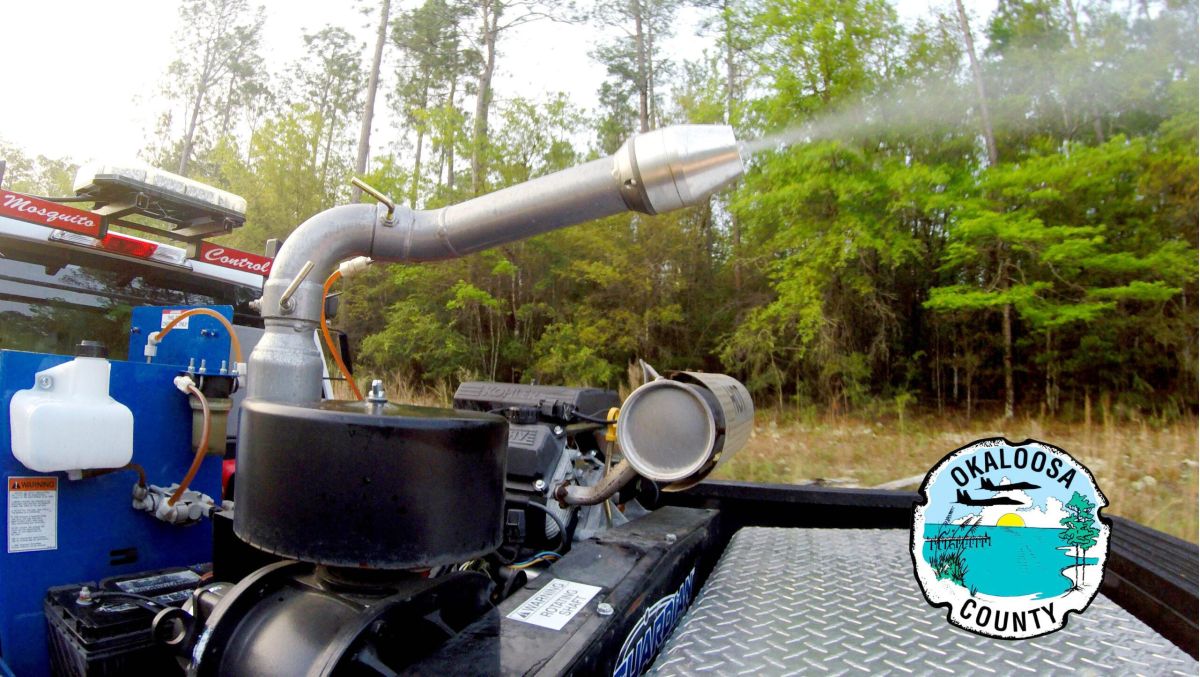The county’s mosquito war is underway

Mosquito spray trucks typically begin operating one hour before sunset and/or one hour after sunrise when most mosquito species are active. However, mosquitos can and are active outside these hours. In rare circumstances, broadcast spraying is performed during daylight hours.
The schedule for broadcast pesticide spraying, aimed at controlling adult mosquito populations, is listed below. (An interactive map for residents to determine when their neighborhood will be sprayed is available at https://bit.ly/OkaloosaMosquitoSpraySchedule.)
MONDAYS:
North County
- C4A to Escambia Farms to Hwy 189 East
- Vinson Ray to Moore’s Mill Creek
- Crestview: Rattlesnake Bluff to Old Antioch Road, from Aplin Road south to Live Oak Church Road
- Four Lakes Road to Mount Olive Road
South County
- Wynnehaven Beach, Florosa and Valparaiso
- Destin: Walton County Line to Airport Road
TUESDAYS:
North County
- Beaver Creek Tower Road to Galliver Cut Off
- Bill Lundy to Laurel Hill
- Crestview: Aplin Road north to Hwy 90, Old Antioch Road to Hwy 90, west of Hwy 85
- Hwy 393 to Poverty Creek Road
South County
- Airport Road to Destin Bridge, Mary Esther/Fort Walton Beach and Bluewater Bay
WEDNESDAYS:
North County:
- Holt north of Hwy 90, Baker west to Galliver Cutoff to Old River Road
- Crestview: Old Bethel Road to Airport Road
- Hwy 90 to South Airport Road. Laurel Hill to Lake Ella Road
South County
- Streets off of Lewis Turner Boulevard to Carmel Drive, Rocky Bayou, Fort Walton Beach from Brooks Bridge to Memorial Parkway
THURSDAYS:
North County
- Lake Ella to Garden City Road
- Baker and Holt south of Hwy 90
- Crestview: Staff Road to Arthur Estates area. Auburn Road to Poverty Creek
South County
- Shalimar, Ocean City, Mooney Road area and Niceville.
Okaloosa County Mosquito Control and the Florida Department of Health urge the public to remain diligent in their personal mosquito protection efforts. These should include remembering to “SWAT.”
▪ Stay inside with screened doors and windows when mosquitoes are biting (dusk and dawn).
▪ When outside, wear clothing that covers skin.
▪ Apply mosquito repellant that includes DEET [N, N diethyl-m-toluamide] on your skin when you are outside
▪ Turn over standing water where mosquitoes lay eggs or rid your outdoor area of standing water in which mosquitoes can lay their eggs.
Okaloosa County Mosquito Control suggests the following steps to prevent mosquito-borne illnesses:
DRAIN standing water to stop mosquitoes from multiplying:
- Drain water from garbage cans, house gutters, buckets, pool covers, coolers, children’s toys, flower pots or any other containers where sprinkler or rain water has collected.
- Discard tires*, drums, bottles, cans, pots and pans, broken appliances and other items that aren’t being used.
- Empty and clean birdbaths and pets water bowls at least once or twice a week.
- Protect boats and vehicles from rain with tarps that don’t accumulate water.
- Maintain swimming pools in good condition and appropriately chlorinated. Empty plastic swimming pools when not in use.
* Waste tires can be dropped off FREE to residents at the South Okaloosa County Transfer Station and the Baker Landfill. Free waste tire drop-off is limited to passenger car and light truck tires, with a cap of five tires per household per month. Businesses are required to pay a small fee.
COVER skin with clothing or repellent:
Clothing: Wear shoes, socks, long pants and long sleeves. This type of protection may be necessary for people who must work in areas where mosquitoes are present.
Repellent: Apply mosquito repellent to bare skin and clothing. Always use repellents according to the label. Repellents with DEET, picaridin, oil of lemon eucalyptus, and IR3535 are effective. Netting: Use mosquito netting to protect children younger than 2 months old.
COVER doors and windows with screens to keep mosquitoes out of your house. Repair broken screening on windows, doors, porches, and patios.
Besides conducting mosquito spraying, the county runs a robust larviciding program, treating around 2,000 sites that are regularly monitored. Also, over 750 ponds and spots with standing water are stocked with gambusia fish, which feed on mosquito larvae and reproduce quickly.
Residents are encouraged to vaccinate their outdoor animals against mosquito-borne diseases. Horses need protection against Eastern Equine Encephalitis through vaccination. While West Nile and EEE can pop up year-round, they peak in August, September, and October.
Horses require two vaccine shots, spaced three to six weeks apart, followed by boosters every three to six months. Dog owners should also ensure their pets are treated for heartworms, as some mosquitoes in Okaloosa County can transmit this disease too.
The Mosquito Control Division of Public Works is open from 8 a.m. until 4:30 p.m. Monday through Thursday and can be reached at (850) 651-7394 or (850) 689-5772. For mosquito spray schedules, preventative tips and other related information, visit http://www.myokaloosa.com/pw/environmental/mosquito-control.




